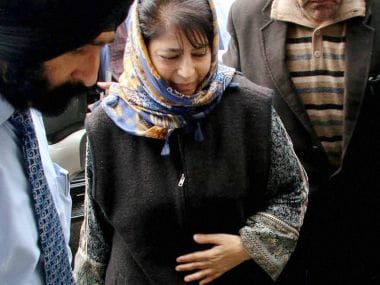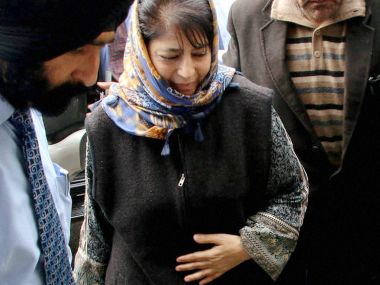The potential for an explosion of anger in Kashmir has increased exponentially over the past few days. For, if there is one issue that unites Kashmiris and generates a feeling that their identity is under threat, it’s the idea that “outsiders” may be allowed to settle here permanently. It was this fear that lurked behind the uprising of 2008, following the transfer of land to the Amarnath Shrine Board. That, let us remember, was the initial uprising that set off the chain of events that eventually led to the very challenging situation currently in place. [caption id=“attachment_3907335” align=“alignleft” width=“380”]
 Jammu and Kashmir chief minister Mehbooba Mufti. PTI[/caption] “Outsiders” are prohibited from buying property or seeking government employment in the state because of a proclamation by the last maharaja of Kashmir, in January 1927. Ironically, his order was in response to a demand made by Dogras and Pandits, who feared that Punjabis were a threat to their stranglehold over higher and clerical jobs, respectively. It is pertinent to remember that the same maharaja, Hari Singh, signed the instrument of accession to India in 1947. Most Kashmiris mistakenly believe that the ban on outsiders who are not state subjects stems from Article 370 of the Constitution. But that is not so. In fact, that hastily drafted article vouchsafed the right of the state’s separate constituent Assembly to reject any Indian laws beyond the basic areas of accession — defence, foreign relations and communication. The relationship between the state and India was then worked out through the New Delhi Agreement in 1952. Article 35A was inserted into the Constitution of India through a presidential order in 1954, to guarantee that the maharaja’s ban on outsiders would remain. It actually makes little difference in practical terms, for domicile rights apply in other states too. But Article 370 (and now 35A as well) has become a totem — a symbol of the fact that Kashmir has not completely been integrated into India. That is why it excites strong emotions, both within Kashmir and among BJP, RSS and the “nationalists”. Chief Minister Mehbooba Mufti has done well to oppose the legal challenge to Article 35A. And since the Article has been challenged in the Supreme Court, which will give its verdict next month, the issue has assumed explosive potential. It is better that the party in power in the state takes up this issue, rather than leave it to avowed secessionists. For, such are the ironies of Kashmir that those who generally insist that they want nothing to do with India would shrilly contest an issue regarding constitutional provisions. Mufti succinctly worded the issue while inaugurating a conference in New Delhi recently. The question, she said, is, “How much is the idea of India willing to accommodate the idea of Kashmir?” Personally, she said, the idea of India for her included Indira Gandhi. (The former prime minister had treated Mufti like a niece when the latter’s father was in the Congress). Some observers wondered if that was a political signal. The chief minister seemed to be in a mood to reach out — even to the Opposition in Kashmir. Her speech endorsed Sheikh Abdullah — even though her father and the Abdullahs were bitter rivals. She dug in her heels against unitary nationhood. She pointed out that Jammu and Kashmir had defied the ’two-nation theory’ to join India in 1947 on certain assurances and conditions, but had faced dishonesty, including the “dismissal of governments, charges of sedition, hanging, and more security forces”. Other leaders, like National Conference patron Farooq Abdullah, have also warned of the explosive potential of this issue. The central government, for its part, has done well to place before the Supreme Court through Attorney General KK Venugopal that this is a sensitive matter that needs larger debate. This indicates that the Centre is aware of its explosive potential. Even though its a long-established objective of the BJP and its predecessor, the Bharatiya Jana Sangh, it would be foolhardy to move ahead on it when there are such great challenges to national security — from Kashmiri militancy, from Pakistan, and from China.
Jammu and Kashmir chief minister Mehbooba Mufti. PTI[/caption] “Outsiders” are prohibited from buying property or seeking government employment in the state because of a proclamation by the last maharaja of Kashmir, in January 1927. Ironically, his order was in response to a demand made by Dogras and Pandits, who feared that Punjabis were a threat to their stranglehold over higher and clerical jobs, respectively. It is pertinent to remember that the same maharaja, Hari Singh, signed the instrument of accession to India in 1947. Most Kashmiris mistakenly believe that the ban on outsiders who are not state subjects stems from Article 370 of the Constitution. But that is not so. In fact, that hastily drafted article vouchsafed the right of the state’s separate constituent Assembly to reject any Indian laws beyond the basic areas of accession — defence, foreign relations and communication. The relationship between the state and India was then worked out through the New Delhi Agreement in 1952. Article 35A was inserted into the Constitution of India through a presidential order in 1954, to guarantee that the maharaja’s ban on outsiders would remain. It actually makes little difference in practical terms, for domicile rights apply in other states too. But Article 370 (and now 35A as well) has become a totem — a symbol of the fact that Kashmir has not completely been integrated into India. That is why it excites strong emotions, both within Kashmir and among BJP, RSS and the “nationalists”. Chief Minister Mehbooba Mufti has done well to oppose the legal challenge to Article 35A. And since the Article has been challenged in the Supreme Court, which will give its verdict next month, the issue has assumed explosive potential. It is better that the party in power in the state takes up this issue, rather than leave it to avowed secessionists. For, such are the ironies of Kashmir that those who generally insist that they want nothing to do with India would shrilly contest an issue regarding constitutional provisions. Mufti succinctly worded the issue while inaugurating a conference in New Delhi recently. The question, she said, is, “How much is the idea of India willing to accommodate the idea of Kashmir?” Personally, she said, the idea of India for her included Indira Gandhi. (The former prime minister had treated Mufti like a niece when the latter’s father was in the Congress). Some observers wondered if that was a political signal. The chief minister seemed to be in a mood to reach out — even to the Opposition in Kashmir. Her speech endorsed Sheikh Abdullah — even though her father and the Abdullahs were bitter rivals. She dug in her heels against unitary nationhood. She pointed out that Jammu and Kashmir had defied the ’two-nation theory’ to join India in 1947 on certain assurances and conditions, but had faced dishonesty, including the “dismissal of governments, charges of sedition, hanging, and more security forces”. Other leaders, like National Conference patron Farooq Abdullah, have also warned of the explosive potential of this issue. The central government, for its part, has done well to place before the Supreme Court through Attorney General KK Venugopal that this is a sensitive matter that needs larger debate. This indicates that the Centre is aware of its explosive potential. Even though its a long-established objective of the BJP and its predecessor, the Bharatiya Jana Sangh, it would be foolhardy to move ahead on it when there are such great challenges to national security — from Kashmiri militancy, from Pakistan, and from China.
David Devadas is an expert on politics and geopolitics. Formerly a Senior Fellow at the Nehru Memorial Museum and Library, Visiting Professor at Jamia Millia Islamia, and Political Editor of Business Standard, he is currently Distinguished Fellow at the Institute for Social Sciences. He has written books on Kashmir, on youth, and on history. He has been a radio compere, guest faculty at JNU's Academic Staff College, St Stephen's College and Hindu College. He has worked for the Indian Express, The Hindustan Times, India Today, The Economic Times and Gulf News. His most impactful article, on a murder cover-up, prevented a Congress President from becoming prime minister. One led to the closure of an airline, and another created a furore and consequent clean-up in Delhi's health department. Several have correctly predicted election results in key states, and a series of reports from Srinagar made the government aware of how unsettled the situation there was in 1990. He is an alumnus of St Xavier's School, St Stephen's College, and the Indian Institute of Mass Communication. He has lived for extended periods in Geneva and Berlin, and has traveled to almost 50 countries. He enjoys various kinds of music, theatre, design, architecture and art.
)